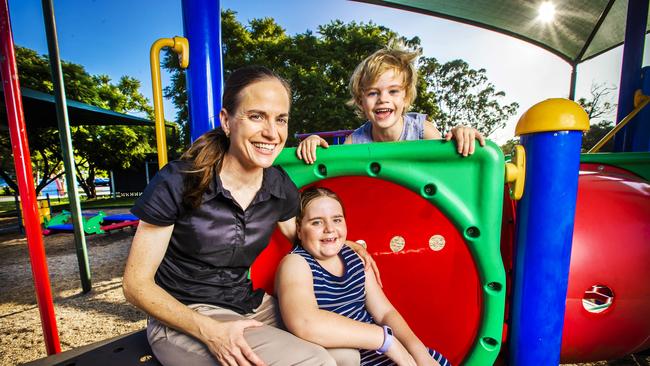‘Clear advocacy’: Courier Mail’s campaign wins $1b for mental health
Businesses will bankroll a critical $1.6bn in funding for the state’s mental health crisis through a new levy, after Treasurer Cameron Dick was convinced by a Courier Mail-led campaign.
QLD Politics
Don't miss out on the headlines from QLD Politics. Followed categories will be added to My News.
A Courier-Mail campaign has been credited by Treasurer Cameron Dick as the reason he has set aside an additional $425 million every year to fund mental health services across Queensland.
Unveiling the ‘biggest ever investment in mental health services’ in the state’s history, the Treasurer paid tribute to The Courier-Mail’s ‘advocacy journalism’.
“I don’t agree with everything The Courier-Mail says ... but they were very clear in their advocacy ... and that’s why we delivered a dedicated stream of funding for mental health,” he said.
Mr Dick said the $1.6 billion over five years would focus on adolescent day programs, additional community care units, and services to support patients after they are discharged.
Businesses will bankroll critical funding for the state’s mental health crisis through a new levy that’s expected to boost coffers by the $1.6 billion over five years, but industry says the Palaszczuk government is only providing half of what’s needed.
EDITOR’S VIEW: MENTAL HEALTH FUNDING WELCOME, BUT WHERE’S THE VISION?
Following The Courier-Mail’s Through the Cracks campaign, which highlighted the state’s lack of spending on mental health services, Mr Dick on Tuesday revealed “the biggest ever investment” in Queensland.
Businesses with an annual wages bill of more than $10 million will have to pay a 0.25 per cent levy from January 1 next year.
And businesses which pay more than $100 million in wages annually will pay an additional 0.5 per cent levy.
It’s expected to impact about one per cent of Queensland businesses and generate $425 million each year.

But AMAQ president Maria Boulton said the new funding was only 50 per cent of what they had asked for.
“And as you know, 20 per cent of Queenslanders will suffer mental health issue every year and our loved ones will go through it as well,” she said.
“So we’re very disappointed to see that only 50 per cent of what we asked was spent.”
The Opposition had called for the government to rule out a new tax to fund solutions to the mental health crisis following months of calls for a major investment of about $750 million per year recurrently.
A parliamentary inquiry, which was sparked by this newspaper’s campaign, agreed that Queensland’s per capita spend had been below the national average for a decade and said the state should create a “dedicated funding stream” to finance this.

Premier Annastacia Palaszczuk said the new funding was “absolutely needed”.
“So I think that the top one per cent of businesses will understand that this mental health impact is across the board and there would be people in their workplaces that have felt it and
there are people in all of our workplaces that feel it each and every day,” she said.
Queensland Alliance for Mental Health (QAMH), the peak body for community organisations in the sector, welcomed the new dedicated cash stream but said the increased investment came against the backdrop of a decade of underfunding.
“Let’s be honest, we know from the recent inquiry that we’ve been underfunded against the national average, so it’s absolutely needed and we need more probably,” QAMH chief executive Jennifer Black said.
But Chamber of Commerce and Industry Queensland chief executive Heidi Cooper said the investment was “really important”.
“We know that’s an issue across our community, but we also know it’s an issue in our business community,” she said.

SmartClinics West End General Practitioner and mum Jacqui Kelly said despite a record budget there is still an issue with patients being able to access psychologists.
Ms Kelly said a lot of mental health is still “the silent disease”.
“As a GP I can honestly say Covid has brought a mental health crisis and from the ages of five to 75 I have seen social, health and generalised anxiety, perfectionism, body dysmorphia, self harming and eating disorders etc,” she said.
“The budget may not be able to cover these post-Covid mental health issues - sure they were around pre-Covid but psychologists were easier to find for patients quickly pre-Covid.”
Ms Kelly said GP’s are “limited” with consult times between 15 and 30 minutes whereas “psychologists get an hour to spend with patients”.
“We need psychology to be more affordable to patients and better subsidised by Medicare and thus, the budget,” she said.



